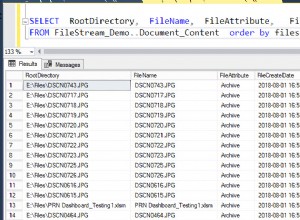Este artigo lista o SQL
UPDATE sintaxe, conforme implementado por vários sistemas de gerenciamento de banco de dados (DBMSs). A sintaxe é listada exatamente como cada fornecedor a listou em seu site. Clique no link aplicável para ver mais detalhes sobre a sintaxe de um determinado fornecedor. Os SGBDs cobertos são MySQL, SQL Server, PostgreSQL e Banco de Dados Oracle.
MySQL
Do Manual de Referência do MySQL 5.7.
Sintaxe de tabela única:
UPDATE [LOW_PRIORITY] [IGNORE]table_referenceSETcol_name1={expr1|DEFAULT} [,col_name2={expr2|DEFAULT}] ... [WHEREwhere_condition] [ORDER BY ...] [LIMITrow_count]
Sintaxe de várias tabelas:
UPDATE [LOW_PRIORITY] [IGNORE]table_referencesSETcol_name1={expr1|DEFAULT} [,col_name2={expr2|DEFAULT}] ... [WHEREwhere_condition]
SQL Server
Da referência Transact-SQL:
[ WITH <common_table_expression> [...n] ]
UPDATE
[ TOP ( expression ) [ PERCENT ] ]
{ { table_alias | <object> | rowset_function_limited
[ WITH ( <Table_Hint_Limited> [ ...n ] ) ]
}
| @table_variable
}
SET
{ column_name = { expression | DEFAULT | NULL }
| { udt_column_name.{ { property_name = expression
| field_name = expression }
| method_name ( argument [ ,...n ] )
}
}
| column_name { .WRITE ( expression , @Offset , @Length ) }
| @variable = expression
| @variable = column = expression
| column_name { += | -= | *= | /= | %= | &= | ^= | |= } expression
| @variable { += | -= | *= | /= | %= | &= | ^= | |= } expression
| @variable = column { += | -= | *= | /= | %= | &= | ^= | |= } expression
} [ ,...n ]
[ <OUTPUT Clause> ]
[ FROM{ <table_source> } [ ,...n ] ]
[ WHERE { <search_condition>
| { [ CURRENT OF
{ { [ GLOBAL ] cursor_name }
| cursor_variable_name
}
]
}
}
]
[ OPTION ( <query_hint> [ ,...n ] ) ]
[ ; ]
<object> ::=
{
[ server_name . database_name . schema_name .
| database_name .[ schema_name ] .
| schema_name .
]
table_or_view_name} PostgreSQL
Do Manual do PostgreSQL 9.5:
[ WITH [ RECURSIVE ] with_query [, ...] ]
UPDATE [ ONLY ] table_name [ * ] [ [ AS ] alias ]
SET { column_name = { expression | DEFAULT } |
( column_name [, ...] ) = ( { expression | DEFAULT } [, ...] ) |
( column_name [, ...] ) = ( sub-SELECT )
} [, ...]
[ FROM from_list ]
[ WHERE condition | WHERE CURRENT OF cursor_name ]
[ RETURNING * | output_expression [ [ AS ] output_name ] [, ...] ] Banco de dados Oracle
Da documentação on-line do banco de dados Oracle 12c Versão 1 (12.1):
UPDATE [ hint ]
{ dml_table_expression_clause
| ONLY (dml_table_expression_clause)
} [ t_alias ]
update_set_clause
[ where_clause ]
[ returning_clause ]
[error_logging_clause] ; DML_table_expression_clause::=
{ [ schema. ]
{ table
[ partition_extension_clause
| @ dblink
]
| { view | materialized view } [ @ dblink ]
}
| ( subquery [ subquery_restriction_clause ] )
| table_collection_expression
} partition_extension_clause::=
{ PARTITION (partition)
| PARTITION FOR (partition_key_value [, partition_key_value]...)
| SUBPARTITION (subpartition)
| SUBPARTITION FOR (subpartition_key_value [, subpartition_key_value]...)
} subquery_restriction_clause ::=
WITH { READ ONLY
| CHECK OPTION
} [ CONSTRAINT constraint ] table_collection_expression ::=
TABLE (collection_expression) [ (+) ]
update_set_clause ::=
SET
{ { (column [, column ]...) = (subquery)
| column = { expr | (subquery) | DEFAULT }
}
[, { (column [, column]...) = (subquery)
| column = { expr | (subquery) | DEFAULT }
}
]...
| VALUE (t_alias) = { expr | (subquery) }
} where_clause ::=
WHERE condition
returning_clause::=
{ RETURN | RETURNING } expr [, expr ]...
INTO data_item [, data_item ]... error_logging_clause::=
LOG ERRORS
[ INTO [schema.] table ]
[ (simple_expression) ]
[ REJECT LIMIT { integer | UNLIMITED } ] Sobre a UPDATE Declaração
A ATUALIZAÇÃO A instrução altera os valores das colunas especificadas em todas as linhas que satisfazem a condição. Somente as colunas a serem modificadas precisam ser incluídas no SET cláusula; as colunas não modificadas explicitamente mantêm seus valores anteriores.




